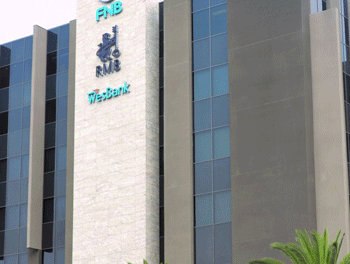
FNB profit soars, yet again
Excessive profit among banks is now becoming commonplace. FNB Namibia Holdings proved this when it released its consolidated financial results for the year ended June 2016, on Thursday morning. The bank’s profit is up a staggering 21.9% or N$1.2 billion according to FNB Holdings chief bean counter Oscar Capelao.
CEO Sarel van Zyl said, “FNB positioned all its operating entities to make the most of limited growth opportunities and produced another set of excellent results in an increasingly difficult operating environment. We thank all our stakeholders, including the shareholders, staff, customers and the government for making these results possible so that we, in turn, can be partners to increased wealth for our country and its people.”
Headline earnings, adjusted for the sale of the Talas building in Windhoek increased by 15.7% to N$1136 million. Earnings per share increased to 459.7 cents (2015: 377.5 cents). “Normalised earnings – adjusted for headline earnings adjustments, non-operational items and regulatory anomalies – we believe are a more accurate reflection of performance” said van Zyl. Normalised profits for the year increased by 18.2% to N$1119million. Key ratios all remained good. An applying headline earnings, return on average equity was 31.0% (2015: 32.2%), return on average assets rose to 3.6% (2015: 3.5%) and the cost to income ratio improved to 43.7% (2015: 43.9%).
The Banking Group dominated the contribution to the local group’s earnings with net interest income growing by 13.8% to N$1653.6 million (2015: N$1452.8 million). Capelao elaborated, “Margins have not widened to the extent experienced previously when interest rates increased, mostly due to the relative increase in cost of funds during the cycle. Net interest margin improved slightly, mainly through higher interest income on advances. Advances priced mostly from the prime overdraft rate, which effectively increased by 75 basis points.”
Net fee and commission income increased by 13.5%, impacted by the Bank of Namibia’s directive exempting fees being charged on cash deposits made by individuals and SMEs which came into effect in April 2015. This item is also impacted by Namfisa’s directive on policy fees for FNB Insurance Brokers, FNB’s short term brokerage.
Group operating costs increased by 16% while generating an operating income growth of 19.6%. “This positive trend is reflected in the continued improvement of our cost to income ratio of 43.7% (2015: 43.9%). Staff related costs are up 15%, including growth in head count largely due to reinforcing our risk and compliance team. Other triggers of the inflationary increase include property costs reflecting constant investment in our footprint. While the focus was on the new Windhoek building, an additional outlet was opened in Rundu in December 2015 to alleviate branch congestion. In addition, 42 additional ATMs and mini ATMs were installed with associated data line, rental costs and guarding costs,” advised Capelao.
The group’s total assets grew by 14.8% to N$34.2 billion. Year-end advances, making up 75.4% of the balance sheet, reflected a year on year increase of 12.9% to N$25.8 billion. Average advances grew 14% on the back of business and corporate portfolios. Growth throughout the year has remained mostly ahead of private credit extension which was 12.1% in June 2016, although interest rate hikes have impacted the PSCE growth rate.










































